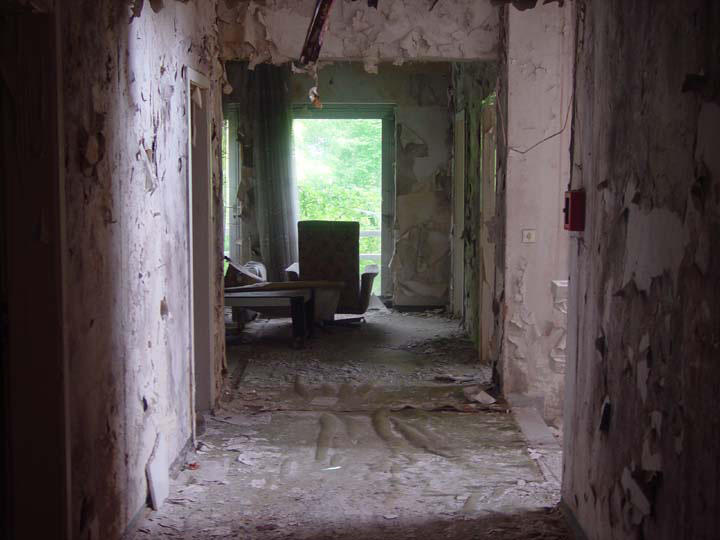
I.
There’s no address but the directions are specific enough: just off Tschaikowskistrasse in the district of Pankow in northeastern Berlin, at the back of an inocuous office park. It takes a moment before you notice the building in the right rear corner: identical to the others but for the overgrown bushes and trees, the broken and boarded up windows, the wide steps and balconies strewn with junk. A heavy metal fence runs in front of the entryway and driveway. The front windows and upper floor balconies are quiet, dark, forlorn. Hints of missing detail suggest a once-ornate entrance, subsequently stripped of insignia. In fact there’s no signage of any kind, no names on the doorbell, no plaques or emblems, no flag on the pole. The front gate is padlocked with a heavy chain. The gate and fence are hardly chest-high. There’s no “No Trespassing,” no Betreten Verboten sign, the locked gate is a hindrance to nobody but the postman. Go ahead, climb over to the other side of the fence…
Welcome to Iraq.
Courtesy of the German Democratic Republic.
You are now in a sovereignty-free zone.
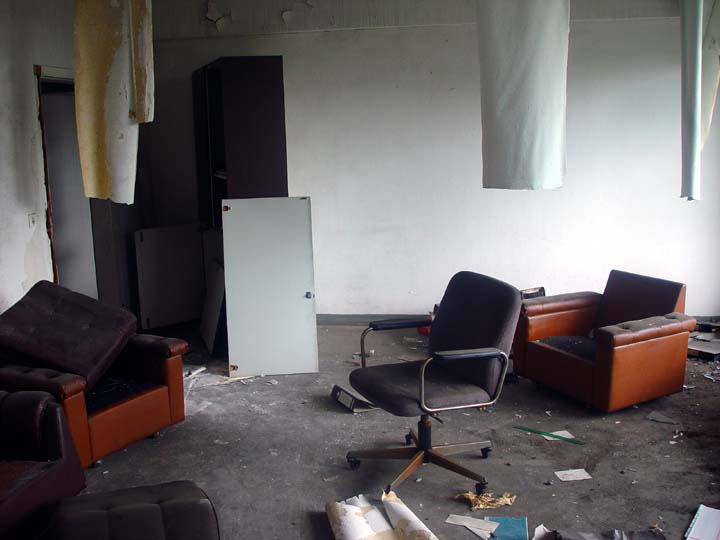
II.
The house was abandoned rather hastily, from the look of it, around a decade ago. Before that, we were told, it housed the official diplomatic mission of the Republic of Iraq. So this was sovereign domain, a special territorial status — “The premises of the mission shall be inviolable” — accorded by Article 22 of the 1960 Vienna Convention on Diplomatic Relations, which Iraq ratified in 1963. The “premises” were granted, in this case, by the German Democratic Republic, itself a once-sovereign domain created in 1949 in territory that, since the end of WWII, had been designated simply the Soviet occupation zone. In 1990, the GDR ceded its sovereignty to the Federal Republic of Germany; in 1994 all international treaties signed by the GDR were legally “dissolved.”
Officially, there was no such thing as private property in member states of the so-called Communist Block. But issues of territorial demarcation and control remained acute. Just three blocks west of here was the Berlin Wall, erected in 1961 by East Germany’s ruling party, the SED or Socialist Unity Party of Germany, on the territorial border with the FRG. Some time after that, this little plot of land must also have been legally appropriated by the GDR, then ceremonially handed over — sold, in fact, for a one-time payment of hard currency — to the State of Iraq, more specifically to delegates of the Arab Socialist Ba’ath Party, which took control after the 1968 Iraqi Revolution.
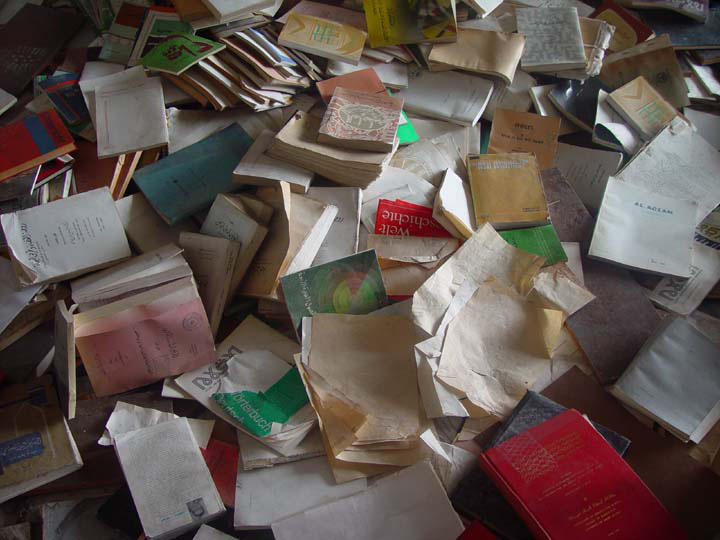
III.
In one neighborhood, two extremes of the adage “good fences make good neighbors”: the Berlin Wall, or “anti-fascist protective barrier” as it was officially called in the GDR (notwithstanding the fact that the prototype for the “fascists” that the Wall was built to protect against also had called themselves “national” Socialists); and this metal fence, a less obtrusive demarcation of a more amicable arrangement between “brother” socialist states. According to article 22.2 of the Vienna Convention, “The receiving State is under a special duty to take all appropriate steps to protect the premises of the mission against any intrusion or damage and to prevent any disturbance of the peace of the mission or impairment of its dignity.” A wall within the Wall, a kind of diplomatic island enclave. Safe harbor for the socialist jet set — while it lasted.
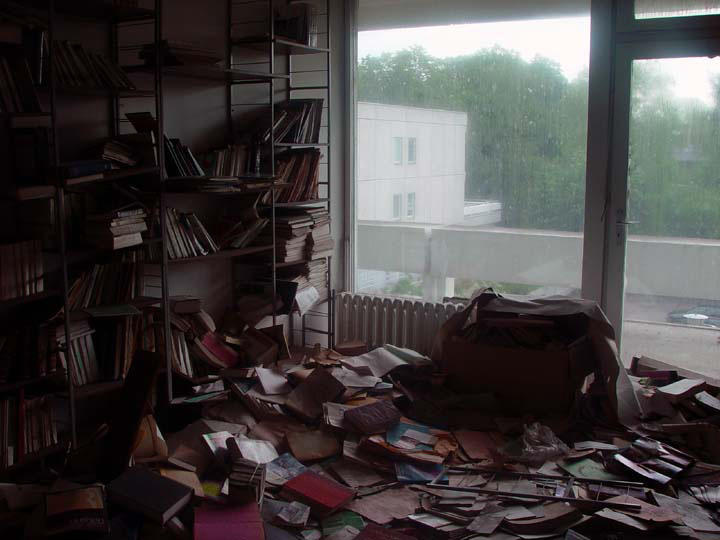
IV.
To get inside the building you have to clamber over the balcony to the second floor, then squeeze through a hole hewn through a boarded-up window at the back of the house. You tread cautiously from room to room through hallways of peeling wallpaper, decaying plaster and rotting carpets — notoriously cheap East German construction materials unable to withstand exposure to the elements. Only the plastic fixtures and electric outlets remain intact, as though oblivious to their obsolescence. In the library, a jumble: German dictionaries, lesson-books, atlases of world history. What remains are the by-products of two cultures, two languages, two systems calling themselves socialism and supported by two visions of “world history” that strove to converge here. In retrospect, of course, nothing more than an enormous coincidence, an historical-political accident that hardly lasted two decades.
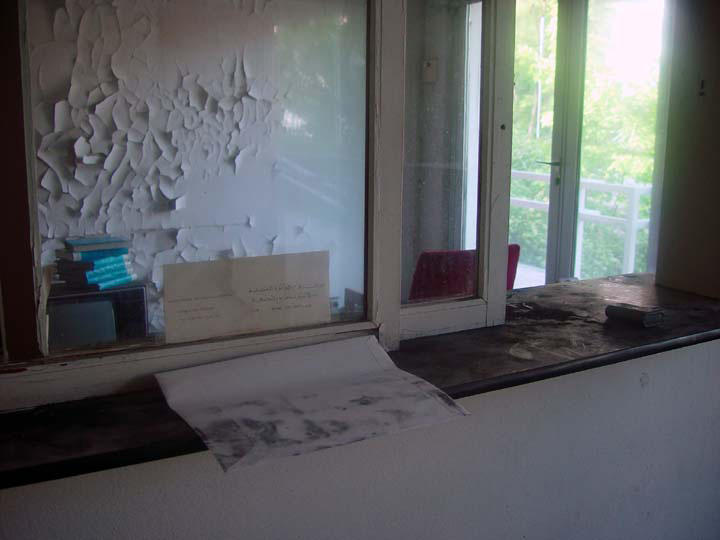
V.
Abandoned by history, the wreckage of two “revolutions.” On the floor underfoot, a magazine in colorful large-format: Fao. Die Geschichte der Befreiung (“Fao: The Story/ History of Liberation”), a commemorative document of Iraq’s most decisive military victory in the war with Iran. On the cover, a single soldier stands atop a sandbag bunker amidst desert sand-dunes, triumphantly holding aloft an Iraqi flag in one hand and a Kalashnikov rifle in the other; behind him, in a circular inset against the blue sky, like a large desert sun, a smiling Saddam Hussein. Inside, photographs of picturesque oases, scarred desert battlefields, cheering crowds of soldiers, and of course many pictures of Saddam Hussein: greeting soldiers, inspecting equipment, meeting with generals, receiving congratulatory phone calls at his desk. And even the text of Saddam Hussein’s speech on the occasion of awarding medals to the Republican Guards: “[…] With God’s help you were able to defend the law and destroy these units of the enemy. And so with God’s help you will bring defeat to the enemy elsewhere.”
VI.
A plot of land: granted, protected, inviolable; then dissolved and abandoned. “To abandon” has two related but quasi-antithetical meanings: to relinquish control of something to another controlling agency, or simply to cease to control, protect or preserve something altogether. The word itself is derived from the Old German bannan, to “command” or “summon,” which in turn, depending on the context or the character of the ruling authority, could also mean to censure, to curse, to excommunicate or prohibit — as in “banned books.” Since then, the Arab Socialist Ba’ath Party, and indeed the sovereign State of Iraq as such, has also ceased to exist, its territory “liberated” into an indefinite state of foreign protectorship. As a consequence, this building and the land that it occupies has fallen under a virtual “ban” — expropriated, excommunicated, accursed. As a non-property, a Niemandsland, it has outlasted even its much more famous and once formidable neighbor, the Wall and the “death strip” (Todesstreifen) it enclosed, nearly all of which has since been reappropriated as public or private land (down the street it has been repaved as a jogging path). In the flood of property claims that swallowed the territory of what was formerly East Germany over the past decade, this piece of land was somehow left an uncharted island. Now it has become a virtual un-territory — a land without qualities awaiting the man without qualities.
VII.
Today, over a decade after the end of the Cold War, one could argue that Baghdad marks the same implacable battle line between East and West, Orient and Occident that once ran through the center of Berlin. Others might argue that it’s not so much a clash of conflicting cultures as rather a battle between democracy and totalitarianism, freedom and tyranny — and both might be right. In any case it is a conflict currently characterized by competing uses of terms like “liberation” and “freedom.” One needn’t necessarily resort to Arabic etymology: consider the German term used by the Iraqi translators: Befreiung. This contains the Old German root frei, from this stems the English “free,” whereas “liberate” stems from the Latin liber, also meaning “free.” It is almost as though, in the American usage of both of these terms, you could still hear echoes the encounter between the legions of the Roman Empire and the Germanic tribes, the Vandals of northeastern Europe, Caesar versus Arminius/Hermann, “civilization” versus “barbarianism” — that is, until both of these terms were assimilated into a single set of meanings, and a singular sense of civilization, that was henceforth opposed to all that resisted it: the subterranean forces of “terror” versus the airborne forces of “shock and awe.”
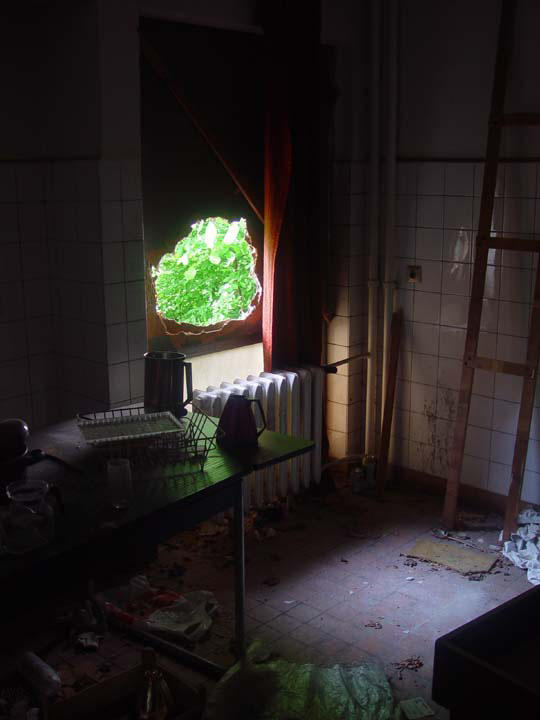
VIII.
A dusty, decaying waiting room in an abandoned diplomatic mission of extinct states. Plastic chairs waiting haplessly to be sat and waited in. A reception counter, on which an unopened envelope lies smudged with dirt — as though it had already been dropped and stepped on, then somehow made its way off the floor and back to its place; delivered, yet still waiting to be opened and state its business, reveal its message. But really, aren’t you happy not to know, happy not to have had to enter this room and endure its ambience back when it was still a place where one still had to sit and wait, in fear or hope, for anything? Nevertheless, you pick up the letter, open it — plain white paper, hand-typed in German — and read:
Peace on Earth ……. Peace on Earth …….
Very Honorable Mr. President Hussein!
Very Honorable Mr. President Bush!
Men who pray to the ONE GOD are with one another
and celebrate the festival of the birth of Jesus—
God comes to make peace.Children, many children and young people, parents and
old people are with one another.
They ask for peace!
You, highly respected Mr. Presidents, can grant this request.
The undersigned — Leipzig Christians — believe
that the path to peace is the Will of God.
God bless you on the path to peace!
Under the typewritten text, and continuing on a second page, eighty signatures in black, blue, and red ink. The uneven, quasi-legible signatures reflexively remind you of the Declaration of Independence — another revolution, another war of “liberation.” Another battle line, another gulf between incompatible systems of belief and versions of history, demarcated by that loaded-empty word “peace” (Frieden) — the forgotten shibboleth of the Cold War.
IX.
Of course the choice to view this house on Tchaikovsky Street as an aesthetic object is more than just a question of taste. Aesthetically nondescript, politically all but nullified, neither entirely empty in the present nor undeniably haunted by its past, it is almost as though the building itself were holding its tongue. Not as though its tongue had been torn out, not quite — though the many hanging curls of wallpaper tempt such grim associations. Nor is it exactly speaking in tongues, though the books in many languages scattered on the library floor silently babble reminders of Babel’s toppled tower, whose legendary location is just west of Baghdad. Rather, behind its blank façade this building seems to have simply fallen silent, resting its tongue like the chiffon curtain resting patiently on the chair in the dining room, apprehensively tasting the wreckage of history that surrounds it, as reticent and elegant as Klee’s angelus novus as imagined by Benjamin.
Climbing back over the fence as though disembarking from a peculiarly disconcerting carnival ride — call it “Journey to the End of History” — you re-enter the historical-political present: in the newly unified capitol of recently unified Germany, at the center of unified Europe, in an innocuous office park just off Tschaikowskistrasse, in the district of Pankow in northeastern Berlin…